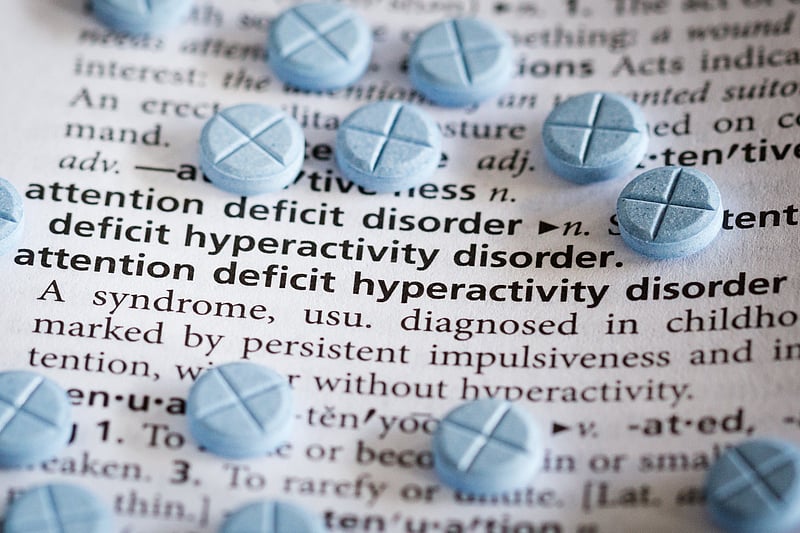Get Healthy!

- Cara Murez
- Posted September 18, 2023
ADHD Drug Errors Among Kids Have Quadrupled in 20 Years
Over 3 million American children now take medication for attention-deficit/hyperactivity disorder (ADHD), but new research shows medication errors have spiked nearly 300% in the past two decades for these kids.
The increase in ADHD medication errors parallels the increase in ADHD diagnoses, said study co-author Dr. Gary Smith, director of the Center for Injury Research and Policy at Nationwide Children's Hospital in Columbus, Ohio.
"Because therapeutic errors are preventable, more attention should be given to patient and caregiver education, and development of improved child-resistant medication dispensing and tracking systems,"Smith suggested. "Another strategy may be a transition from pill bottles to unit-dose packaging, like blister packs, which may aid in remembering whether a medication has already been taken or given."
About 10% of American children had an ADHD diagnosis in 2019, Smith said, making it one of the most common childhood neurodevelopmental disorders.
The study, which researched errors reported through poison control centers from 2000 to 2021, found that about 54% of these mistakes happened when someone was accidentally given or took their medication twice.
In about 13% of cases, someone inadvertently took or was given someone else's medication, Smith said, and in about 13% of cases, the wrong medication was taken or given.
A very large number of these mishaps, about 93%, happened at home. In two-thirds of cases, they involved kids aged 6 to 12.
"In 83% of cases, the individual did not receive treatment in a health care facility; however, 2.3% of cases resulted in admission to a health care facility, including 0.8% to a critical care unit,"Smith noted.
Another 4% of cases were associated with a serious medical outcome, the study found.
For some children, these mistakes cause agitation, tremors, seizures and changes in mental status. Children younger than 6 were twice as likely to experience a serious medical outcome than older kids. They were also more than three times as likely to be admitted to a health care facility.
When mistakes didn't happen at home, school was the next most likely place, with 5% of events. Another 1.6% happened at another location.
The total number of medication errors reported was more than 87,000. Boys were involved in 76% of the mistakes.
The findings were published online Sept. 18 in the journal Pediatrics.
Dr. Andrew Adesman, chief of the division of pediatrics -- developmental & behavioral pediatrics at Long Island Jewish Medical Center in New York City, said it's important with all medications that patients follow the instructions from their health care provider, but it's also possible to see how these types of mistakes can happen.
"Certainly, in my practice over the past 35 years, I've had several instances where families have called and said that a child got an inadvertent excess dose. One example would be that the mother gives the medicine. The father didn't realize it. The father gives the medicine. Nobody said anything. And so it was a right hand-left hand situation,"Adesman said.
Rarely would there be serious side effects with a single instance of doubling a dose, he said.
Adesman wondered if the true number of dosing mistakes was much higher because not everyone reports these incidents to poison control centers, but instead may call their child's doctor or go to an emergency room or urgent care.
More child-friendly formulations of medications may have made it more possible for a child to take medication they shouldn't be having, Adesman said.
"In the old days, we only had pills. Young kids don't swallow pills. Now we have liquids, we have sprinkles, we have chewables,"Adesman said. "And so there's a greater potential for a child to inadvertently or otherwise take a medication."
Many different approaches to treating ADHD exist, but medication is considered the single most effective treatment, Adesman said.
"Time and research have shown that these are very effective treatment approaches. And for the overwhelming majority of patients, the benefits outweigh any side effects,"Adesman said.
While occasionally mistakes may happen, there may be a way to help improve communication issues, such as documenting that the medication has been given using an app.
"Patient education around children speaking up if they're being asked to take a medicine at a dose or frequency that is out of the ordinary could also be helpful,"Adesman said.
Smith said parents should ask their child's doctor or pharmacist if they have questions about their child's medications or correct dosing.
"Keep track of the medications your child takes -- which medications, what dose and how often,"he suggested. "A simple sheet of paper kept near medications or an app may help, especially if multiple caregivers are responsible for giving medications or if a teen is just starting to be responsible for taking their own medicine."
Doctors should consider using teach-back and other techniques to ensure understanding, he said. School personnel should follow medication instruction as listed on accompanying forms.
The study recommends more research and development of improved child-resistant medication dispensing and tracking systems.
"This study only looked at ADHD medications; however, patient and caregiver education and development of improved child-resistant medication dispensing and tracking systems would likely have a positive impact on medication safety for other medications given to children,"Smith said.
More information
The U.S. National Institutes of Health has more on ADHD.
SOURCES: Gary Smith, MD, DrPH, director, Center for Injury Research and Policy, Nationwide Children's Hospital, Columbus, Ohio; Andrew Adesman, MD, chief, division of pediatrics"”developmental & behavioral pediatrics, Long Island Jewish Medical Center, New York York; Pediatrics, Sept. 18, 2023, online




